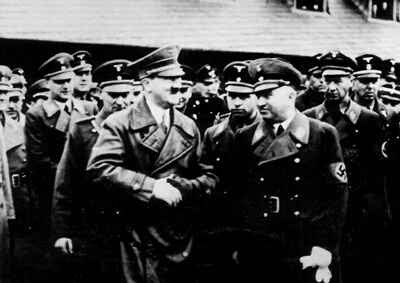Chapter 9: A One-time Installment Fee
 Chairman of the I.G. Farben Board, Carl Duisberg - September 29, 1933
Chairman of the I.G. Farben Board, Carl Duisberg - September 29, 1933"If Germany is again to be great, all classes of our people must come to the realization that leaders are necessary who can act without concern for the caprices of the masses." -Carl Duisberg, 1925, speech to the central organization of German industry - the Reichsverband (33)
And try again they did. To be fair, it was mainly steel companies (34), middle class German patriots and the American pro-Nazi Prescott Bush bank - the "Brown Brothers Harriman" bank - (35) who kept the Nazi's equipped with snazzy uniforms and torches.until the depression hit in 1929. Fearing a communist election victory, more and more of Germany's industrialists began to support Hitler. By 1931, IG Farben was doing so too, although not publicly. (36)
Duisberg (center) with the presidim of the industrial Reichsverband, standing in front of IG headquarters, 1929.
Right-wing historians have tried to downplay I.G.'s "several secret contributions to the Nazi war chest" in 1931 and 1932, (37) and up-play I.G.'s resistance (until 1932) to Hitler's anti-Semitism. (38) Yet this was the depression - a time when everyone was starving and desperate for any job. No specific amount was mentioned, but I.G. was by far the largest corporation in Europe, and any donation was no doubt vital to electoral victory.
I.G. also "dismissed" their most anti-Semitic chemist - Dr. Robert Ley - way back in 1927. However, I.G. paid him a monthly stipend so he "wouldn't defect to a competitor." (39) With that money he founded a Nazi paper in the Rhineland, became an example of Jewish persecution and a martyr, and became a top Nazi. He would later attempt to convince Hitler to use nerve gas at the end of the war. (40) Dr. Ley committed suicide in his cell at Nuremberg before the trial began.
In early 1933, right before the Nazi's last election, four IG representatives showed up at a meeting of German Industrialists and Nazi economic advisors. According to the November 23, 1945 transcripts from Nuremberg war-crimes trial, Hitler and Goering were hitting up the industrialists for election money. Hitler was to have said;
"Now we stand before the last election. Regardless of the outcome there will be no retreat, even if the coming election does not bring about a decision."
Goering then added; "the sacrifices asked for surely would be so much easier for industry to bear if it realized that the election of March 5th will surely be the last one for the next 10 years, probably even for the next 100 years." The Nazi's asked for 3 million marks. They got it, and IG contributed more than ten percent - the largest single contribution. (41)

Schmitz, Krauch & Goering
(33) Sasuly, "IG Farben," p. 65
(34) ibid, p. 60
(35) www.tetrahedron.org/articles/new_world_order/bush_nazis.html
(36) Sasuly, "IG Farben," p. 66
(37) ibid
(38) Turner, Henry Ashby, "German Big Business & the Rise of Hitler," 1985,
(39) "The Warburgs," p. 275-276
(40) "A Higher Form of Killing," p, 62-63
(41) Nuremberg Trial Proceedings Volume 2, FOURTH DAY, Friday, 23 November 1945, Morning Session - www.yale.edu/lawweb/avalon/imt/proc/11-23-45.htm - See also "The Crime and Punishment of IG Farben" p. 71








No comments:
Post a Comment